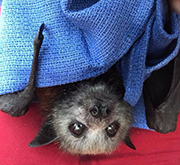Extreme heat causes mass deaths of keystone species
Thursday, January 11, 2018

On January 7, 2018, an extreme heatwave struck southeastern Australia. The wildlife of Sydney and surrounding areas and in particular areas of western Sydney experienced temperatures in excess of 45 degrees Celsius. At temperatures above 42-43 degrees combined with high humidity flying-fox colonies are very vulnerable to heat stress.
As the temperatures reach these levels the bats start to move down the trees as they begin to have difficulty regulating their body temperature. The young pups will succumb first and begin falling from the trees to the ground where they will quickly dehydrate and die.
On January 7th this is what began to happen in the early afternoon. Local WIRES volunteers were monitoring colonies and in the early afternoon began to see the young pups dropping to the ground in their hundreds. This occurred at colonies in Campbelltown, Parramatta Park, Yarramundi, South Creek, and Emu Plains.
Teams were mobilized at many sites and all our vaccinated rescuers who were available began to triage those who had a chance at survival. More than 40 young flying fox pups were taken into critical care from the two camps and heartbreakingly some of those lives have also been lost despite the best care possible. Little 'Yoghurt' above is one of the lucky ones rescued and currently in care and at this stage doing OK.
On the day many hundreds of young pups were able to be re-hydrated and reunited with their parents and credit goes to our amazing volunteers who worked outside in the 45-degree heat to do what they could to help ensure more lives were not lost.
Meanwhile, our volunteers continue to monitor the colonies and even on Wednesday - 3 days later more bodies were still being recovered as even more weakened animals succumb to ongoing stress. We estimate the number of bats lost in these five colonies alone to be approaching 1000, with hundreds more bodies still in the trees too high to be recovered.
Many other species were also being helped by WIRES over the weekend, including possums with burnt feet and many heat-stressed birds including one Gang Gang cockatoo.
Please give what you can to our current appeal, as we experience what is already shaping up to be one of the hottest summers on record.
Recent Posts
WIRES launches its first wildlife rehabilitation centre - Mullyang
WIRES Emergency Response in the wake of ex-tropical cyclone Alfred
International Women’s Day Volunteer Spotlight: Shelley
Tropical Cyclone Alfred – Emergency Wildlife Advice
Interview with WIRES Training and Development
Celebrating Women in Science: The Journey of Holly, Wildlife Conservationist and WIRES Team Member
